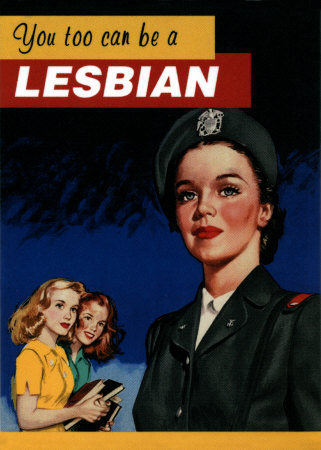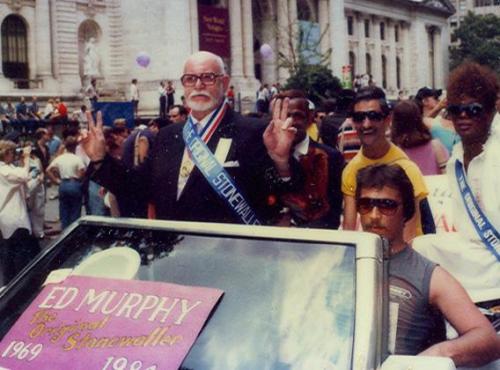#instant follow back
In the United States, World World II was a real game changer for women who loved other women. The demand for labour created a sudden 180 degree turn in the attitude towards lesbianism. Lesbians were considered to be monstrosities the 1930s (read more about it HERE) but in the 1940s the love between females was temporarily understood, undisturbed, and even protected in the military. And in many interesting ways inadvertently sponsored the growth of lesbian subculture.
DURING THE WAR:
- Military service was an opportunity to meet other women and to engage in work and adventure that they were normally denied. Reminiscent of all women’s colleges, women worked in tight quarters free that allowed close relationships to develop unfettered by societel dictates.
- When it became clear for the Women’s Auxiliary Army Corps (WAAC) that women who loved other women worked amongst them they took clear measures to cover it up without compromising their productivity. They did so by:
- Warning officers not to go on witch-hunts to expose or punish such behaviour “any officer bringing an unjust or unprovable charge against a women in this regard will be seriously reprimanded”
- Ordering the officers to be sympathetic to close friendships that “may eventually take some form of sexual expression” - you know, just gals being pals.
- Actions against lesbianism was only to be taken if its “manifestations undermine the efficiency of the individual concerned and the stability of the group”
AFTER THE WAR:
- Increased tolerance among young women - even those who weren’t lesbians developed “Who care’s” kind of attitude.
- The military even helped to introduce lesbian who had honuorable discharges to large metropolitan areas where they could meet women like themselves.
- This helped create large homosexual enclaves - for the first time there were number of American bars that could survive if they catered exclusively toward lesbians.
- Ex-military women stayed because they found anonymity of a big city to be more compatible with what became their life choices.
- To add to this, lesbians once again had the means to be financially independent and build a life with their partner.
= Overall, these opportunities account for the incipient lesbian political consciousness in the United States.
(It is also important to note that this is far from how homosexual men were treated in the military. More about that in a future post)
This is part 3 of this series. Read part 1 HERE and part 2 HERE
Sources:
Odd Girls and Twilight Lovers - a History of Lesbian Life in 20th-Century America by Lillian Faderman
Post link
Edward Francis P. Murphy spent little time being a stranger to breaking the law. Murphy was repeatedly thrown out of Catholic schools and at the tender age of nine he first came to the attention of the police when he attacked the owner of a banana store and trashed his fruit stance. And when his temper didn’t improve he was sent to a reform school after whacking a policeman over the head with a milk bottle for breaking his shoebox. This was only the beginning of Murphy’s unusual relationship with law enforcement.
Murphy’s criminal history begins to take precedence in the late 1940s after his wrestling career. He teamed up with a fellow gay man to rob dentists for their shipments of gold from dental laboratories. They managed to rob seventy-three dental offices before they were finally caught in 1947. Murphy served a total of ten years in prison (the maximum time) in which he spent most of his time in isolation for assaults.
After prison, he worked as a bouncer for gay bar and eventually took a second job as a house detective, marking the start of when his criminal activities have a direct bearing on LGBTQ+ history.
In August of 1965, when Murphy was working for the New York Hamilton as a house detective, he was arrested and charged for being the head of a ring that preyed on hotel guests. Six months later this accusation developed into one in which he was involved in a nationwide ring that blackmailed publicly closeted homosexual men. To no one’s surprise, this became a big hit in the New York media and Murphy’s name suddenly appeared everywhere.
While it was known that the extortion ring was large from the very beginning, as the investigations began coming to a close, it was revealed that its scope and size was astounding. For almost a decade, the ring had extorted $2 million from almost a thousand men. From very very successful men with very very eminent social ranks. From the prosecution cases, it is known that amongst these men were:
- A leading movie actor
- The head of the American Medical Association
- Two army generals
- Admiral William Church
- Republican member of Congress from New Jersey, Peter Frelinghuysen Jr.
- A Princeton professor
The extortion process would begin with a scam. Usually, they would send attractive young men into hotels where wealthy homosexual men came to meet such men. The baits would lure the men into hotel rooms so they (the baits) could attack them to steal their valuables, but perhaps more importantly, their identification. After the ring had weeded out which men had the most to lose in terms of family, profession, or reputation, members of the ring would produce police badges and arrest warrants. Disguised as policemen, they would threaten to arrest the victim, exposing him as a homosexual, and then offer to “forget about it” in return for a generous sum of money.
The blackmailers did not hold back:
- They tracked down the New Jersey congressman at Capitol Hill, marched him out of his own office door and forced him to fly home to pick up the $50,000 they demanded.
- They pulled a surgeon out of an operating room.
- Some members went to the West Coast and got inside a nuclear plant:
The scientist’s superior walked into the office in which the blackmailers were discussing the price of their silence with a scientist. Quick on his feet, the victim introduced the blackmailers as two detective friends from New York. Since the superior thought he was dealing with real detectives, the extortionists were taken throughout the plant that was normally under the heaviest of security strictures.- Many of the outcomes of these stories would unavoidably end tragically:
For instance, Admiral William Church, the head of the New York Naval Yards, was approached by Detective McDonnell. He initially refused to accompany McDonnell to New York to testify before a grand jury. But Church changed his mind and said that he would drive up to New York the following day. Instead, he drove to a Maryland motel to put a bullet through his head.What’s particularly interesting about Murphy’s relationship with law enforcement became noteworthy between 18 February 1966 and 12 July 1967. During this period, Murphy name disappeared from newspaper coverage despite the initial newspaper stories that had proclaimed him to be one of the three leading ringleaders, if not the head of the entire operation.
In March of 1968, the New York Mattachine Newsletter demanded to know why Murphy had not been sentenced for his role in the blackmail ring, on top of the fact that not only had Murphy served prior prison terms, he had also pled guilty under a federal indictment to extortion charges. Murphy had merely been put on probation for five years. It was thereafter reported that Murphy’s sentence had been postponed to work out a ‘deal’ for a lighter sentence as he provided evidence against the two other main figures in the ring. But just how plausible is that one could get off with serving only part of a five-year sentence for solely providing evidence against one’s co-conspirators when one has a criminal record as extensive as Murphy’s and been the brain behind these elaborate crimes for almost a decade?
As it turns out, Murphy was exceptionally talented in targeting the most vulnerable men and happened to land the biggest fish of them all, whose value surpassed even that of money because this one had the authority to protect him from law enforcement; the first director of FBI, J. Edgar Hoover.
Research suggests that with Hoover caught in his web, he continued to blackmail professional gay men that he spotted at gay bars such as the Stonewall Inn where he also worked as a manager. On the other hand, Murphy’s friend explained that Murphy became an informer for the FBI about the mob’s activities. But at some point stopped working with the mob and quit informing because he “wants to become a good guy.” In his turnabout he earned prominence for his aid activism, his work with runaway teens, young prostitutes, and homeless children. He even eventually became known as the “Mayor of Christopher Street”.
Murphy died of AIDS in 1989 at the age of 64.
(I’m not sure if I was clear enough in the text, but yes, Murphy was also gay)
Source:Stonewall: The Riots that Inspired the Gay Revolution by David Carter
Web source and picture source: (x).
Post link


